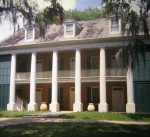 Located in New Iberia’s Main Street District, set among towering live oak trees draped with Spanish moss on the banks of Bayou Teche, The Shadows, built in 1834 for sugar planter David Weeks, paints a vivid picture of life for the four generations that made this property their home. The Shadows is a Classic Revival-style home with a Louisiana Colonial floor plan and a garden that is as breathtaking as the history preserved here.
Located in New Iberia’s Main Street District, set among towering live oak trees draped with Spanish moss on the banks of Bayou Teche, The Shadows, built in 1834 for sugar planter David Weeks, paints a vivid picture of life for the four generations that made this property their home. The Shadows is a Classic Revival-style home with a Louisiana Colonial floor plan and a garden that is as breathtaking as the history preserved here.
David and Mary Weeks were wealthy growers of sugarcane; they owned four plantations totaling approximately 3,000 acres (12 km2) of Acadiana land.
The construction of Shadows-on-the-Teche coincided with the apogee of the Greek Revival style in United States architecture. When following this style, builders minimized the installation of superfluous decorative elements such as cornices, moldings, and trim. Decorations were severely limited and were designed to blend into and set off the building’s brick construction. A simple porticoed facade of eight columns marks the exterior of the facade; the columns help to support a second-floor verandah. The mansion was furnished with Federal-style furniture and Empire-style furniture imported from the U.S. East Coast.
Shadows-on-the-Teche was built on the edge of one of Weeks’s sugarcane plantations in Iberia Parish, in the parish seat. As a town house, Shadows-on-the-Teche was designed for social life and entertainment. It is said that at the time of its construction, Shadows-on-the-Teche was only the third brick house to be built on Bayou Teche.
The Weeks family began to suffer from a series of family tragedies almost at once after the completion of the house. Planter David Weeks, who became chronically ill while Shadows-on-the-Teche was being built, died in August 1834 in New England while seeking medical attention. Mary Weeks remarried lawyer John Moore but kept her children’s property separate from that of her second husband, as she was allowed to do under Louisiana law. This property included the 164 slaves bequeathed to their children under the terms of her first husband’s will.
The Shadows-on-the-Teche household was economically and physically dependent on Louisiana slavery. Mary Weeks and John Moore strongly supported slavery and supported the political changes which they thought were necessary to save it; in 1861, Moore was a delegate to the convention in which Louisiana seceded from the Union. This political status and viewpoint made the household vulnerable during the American Civil War. Federal troops requisitioned occupancy of the property, and officers of the occupying force quartered themselves in it. Mary Weeks died in December 1863 in Shadows-on-the-Teche while part of the house was being used by the Union troops as an officers’ quarters. After David and Mary Weeks’ son William F. Weeks had partly restored the family fortunes during Reconstruction, the Weeks family’s status further declined during the third generation of family owners. The Weeks-Hall family was compelled to sell off much of the land surrounding Shadows-on-the-Teche to meet their living expenses.
David and Mary Weeks’s great-grandson, William Weeks Hall, lived in Shadows-on-the-Teche from 1922 until his death in 1958. A strongly preservation-minded individual, Hall sorted and donated the voluminous archive of family papers that he found in the house. Hall also established and maintained an extensive garden of live oaks, bamboo, camellias, azaleas, aspidistras, and other plantings, in the former plantation house’s remaining grounds. At the end of his life, Hall donated the house and garden to the National Trust for Historic Preservation, which has owned and operated it until the present.
Image taken with the TL 120. I like that the image is not totally sharp. Gives it kind of a dreamy appearance. This is probably way more info on the house than you cared to know 🙂 It was really cool as it still had original family furnishings.
You must be authenticated to view comments.